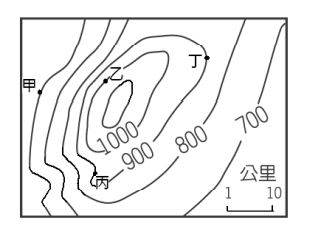|
|
#111年,#警專,#乙組,#地理科 |
| |
西歐是全球冬溫「正偏差」(指冬溫比全球同緯度地區的平均溫度高)最顯著的地區,而這與哪一地理要素有密切的關聯? |
|
|
#111年,#警專,#乙組,#地理科 |
| |
臺灣東北風的風速比西南風強勁,這與下列哪一選項的關係最密切? |
|
|
#111年,#警專,#乙組,#地理科 |
| |

右上表為四個都市的人口資料,請問哪一個都市的人口自然增加率最低?
|
|
|
#111年,#警專,#乙組,#地理科 |
| |
右下圖為一等高線圖,而相鄰兩等高線間距值(高度差)為 100m,請問以下 2 題:

請問下列何項敘述是正確的? |
|
|
#111年,#警專,#乙組,#地理科 |
| |
廠商考量自身規模與經濟情勢,不斷進行著合併和自己生產同類產品的產業或工廠(飛機製造商波音公司合併麥道公司),其主要目的在於? |
|
|
#111年,#警專,#乙組,#地理科 |
| |
某開發中國家的偏遠村鎮因農產品的銷售不易,以致農民相當窮困,後來某科技公司捐贈一批電腦給該村鎮,並協助村鎮架設網路,因而農民可透過網路促銷農產品,使當地農民的財源較以往大幅增加。請問該偏遠村鎮過去在農業產銷上所面臨的最主要困難應是下列哪些?(甲)勞動力不足(乙)市場資訊封閉(丙)交通不便(丁)耕地不足 |
|
|
#111年,#警專,#乙組,#地理科 |
| |
台塑六輕位於臺灣 雲林縣麥寮鄉 ,是將原來的海埔地以填海造陸的方式填為工業區的廠區用地,工業區內有台塑、南亞、台化等廠房,請問以下 2 題:
台塑六輕工業區的廠區主要建築在哪一種地形區上? |
|
|
#111年,#警專,#乙組,#地理科 |
| |
臺塑六輕工業區廠區用地的選址由最早的宜蘭、桃園到雲林麥寮,是經過數年間的爭議過程才定案,請問選址不順的原因為何? |
|
|
#111年,#警專,#乙組,#地理科 |
| |
澳洲墨累─大令盆地位居大分水山脈西側,雨量較少,原本發展牧羊業,後因人工灌溉改善而成為澳洲最大農業區,近年來有些牧場兼營小麥栽種和飼養綿羊,請問以下 2 題:
由於水量不豐,農場只灌不排,但隨著農場規模擴張與數量增加,將可能出現下列何種環境問題? |
|
|
#111年,#警專,#乙組,#地理科 |
| |
牧場兼營小麥栽種和飼養綿羊,是指下列何種農業類型? |
|